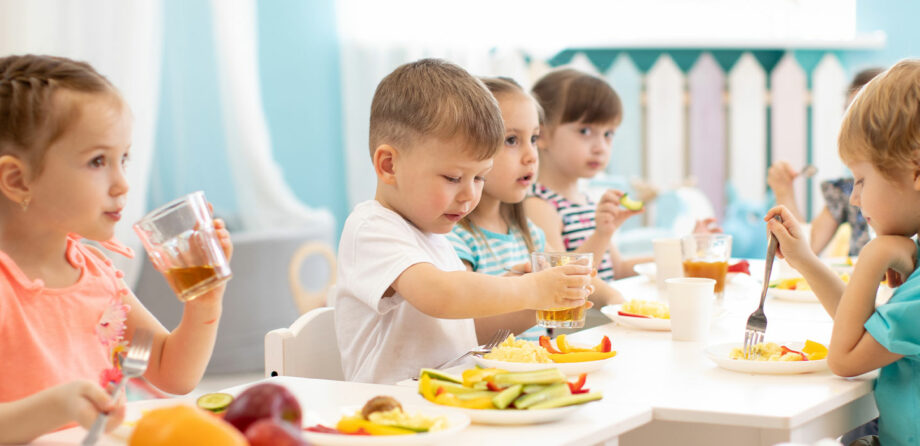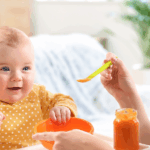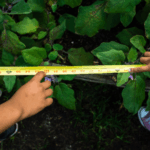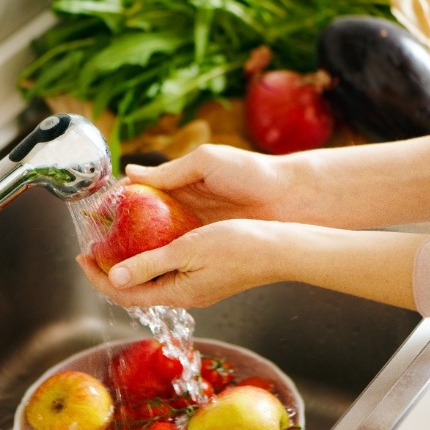
Managing snack times at nursery
For young children, snack times at nursery should be about so much more than just eating. Early years consultant, Tricia Pillay, explores the wonderful opportunities snack time can present.
Snack times at nursery that are well prepared for and well managed can support children’s learning and development in many ways.
It’s a great opportunity for your children to practice physical skills, begin learning to take responsibility for their own health and hygiene and develop social skills as they share time with practitioners and other children in the setting.
By making snack times at nursery comfortable and inviting for children, they’ll look forward to it each day and be eager to get involved. Remember to always treat food and eating as a natural event rather than an achievement that needs praise.
Providers must be confident that those responsible for preparing and handling food are competent to do so and all staff involved in preparing and handling food must receive training in food hygiene, including managing food allergies.
Think about your approach
You might opt for a whole group snack time, with children altogether or in small groups, perhaps with their key person, or you might opt for a café style, free flow snack time, with children making their own decisions about when to have their snack.
A café style, free-flow, snack time can help children to monitor their own needs and make independent decisions about when they are hungry and/or thirsty, or when they are ready to move away from the activity that has previously engrossed them.
Either approach can be successful in providing a meaningful experience for children, as long as they know and understand what is expected from them, they are comfortable and their individual needs are met well.
Snack times at nursery routine
It’s really important that all practitioners know and understand how snack time will be organised and managed. Ensure you maintain the same basic expectations throughout all groups, rooms and situations, e.g. indoors, garden, forest school or out on visits.
Have a clear, simple routine leading into each snack time, for example:
- A sign or sound telling children that it is snack time (it should always be the same sign or sound)
- Ensure children wash their hands before snack time (and during, if necessary) with soap and running water
- Encourage children to help you prepare for snack time e.g. clean tables, wash fruit and vegetables, set out cups and plates, count breadsticks etc.
- During snack time support children to manage spillages – accidents happen, drink gets spilt, food gets dropped. Keep a dustpan and brush, kitchen roll/cloths and a bowl of water close by. This not only facilitates easy cleaning it lets children know that spillages are OK
- Encourage children to help you clear up after snack time by disposing of their food waste, washing up and putting things away (ensure you check this so they are clean and hygienic for future use), cleaning and tidying their place at the table.
- These repetitions may seem to take up time, slowing down the process but they are vital for teaching valuable life skills. Just because you have shown a child how to do something today does not mean that you won’t need to remind them tomorrow. The most successful learning takes lots of repetitions.
Monitoring snack times at nursery
- Support children to manage their own portions
- Remember sometimes children’s appetites may fluctuate due to:
- How much energy they’ve used
- What breakfast they’ve eaten
- Illness
- Events happening at home or at the setting
- Being tired.
- Make sure that you are able to monitor who has had a snack easily and that you provide appropriate support for less confident or younger children to access their snacks.
- Some children, especially those who are less confident or highly sociable might need extra support to move away from the snack table when they have finished.
Consider individual children’s needs when planning your snack time.
- Children having lunch at midday followed by a nap and tea at 4 pm will probably not need a snack when they wake from their nap (although they should have water available and be encouraged to drink)
- Your snack time may be taking the place of breakfast for some children. If so, a free-flow snack bar available throughout the first half of the morning would be beneficial and remember, these children will then need to be able to eat more
- Alternatively, a child who has had a filling and nutritious breakfast may not need more than a drink at morning snack time.
- Sometimes, especially with whole group snack times, you may have to cope with an unexpected delay. At these times, ensure you actively engage children in sharing action rhymes and songs, getting them up off their chairs or the floor and get them moving while they wait, so they are not sitting for prolonged periods.
Get social
If you have a whole-group snack time, try not to treat this as a time for practitioners to be busy elsewhere. Instead, treat snack time as a social point in the day when everyone in the room or setting comes together for a break.
Practitioners should position themselves where they can provide the support needed by individual children most effectively. Remember that children must be within sight and hearing of a member of staff when eating.
It is good practice to have a practitioner sitting with children in a café style free-flow snack bar.
Practitioners should see themselves as a member of the group, sitting with the children throughout and keeping to the expectations that you have for the children, such as using a plate, saying please and thank you and clearing away.
Snack times can also offer a good opportunity for children of different ages to come together for a shared experience. Younger children will learn competencies from older children and older children will learn that younger children might, for example, need more adult help. They may begin to offer help themselves – although this should not be at the expense of younger children developing their own practical and social skills.
It should be a time to enjoy, not only an appetising snack, but also interesting conversations and opportunities to get to know each other better.
Make your children’s snacks appealing by thinking carefully about the presentation of what you offer.
Let children get involved and reduce pre-prepared food:
- Allow children to cut and share fruit with a friend, rather than choosing from a plate of pre-prepared slices
- Provide the children with scissors (for food use only) to cut the fruit or vegetable, rather than selecting them from a plate (remember to supervise this)
- Cut a banana in half while still in its skin so that children can peel it themselves
- Let children grate their own courgettes, carrots or cheese
- Children will become more adventurous in their eating if they do not always have favourite standbys such as apples, grapes and bananas to fall back on. You could try offering: avocado, plums, cherries, celery, little gem lettuce leaves, radish, cucumber, peas picked from their pods in summer, a big slice of watermelon with crunchy seeds.
Cooked fruit or vegetables can also add variety. Carrots boiled for just five minutes are firm but not so hard to digest as raw carrots, Bramley apples, blackberries, gooseberries, plums can all be served stewed with perhaps a little honey (don’t use honey with children under the age of one year).
Consider the needs of your children and the menu over the whole day. You may need to consider providing more filling snacks alongside fruits and vegetables such as cheese and crackers or pitta bread and hummus. Avoid sugar-heavy snacks such as brioche or malt loaf.
Remember to follow the Food Standards Agency guidance on choking hazards: Early Years Choking Hazards
Questions to ask yourself:
- Do children know and understand what is expected?
- Are your expectations for the individual children in your care appropriate?
- Can all children reach everything they need easily (soap, paper towels, plates, cups, cutlery)?
- Are these things always kept in the same place so that even very young, or less confident, children can be independent?
- Are children’s individual needs met well?
- Are children excited by snack time and eager to participate?
Hygiene
Another important aspect of managing snack times at nursery is of course hygiene.
When promoting handwashing at snack time, teach children a short rhyme to recite as they rub the soap all around their hands really thoroughly.
Here’s a hand washing rhyme to try:
This is the way we wash our hands,
Wash our hands, wash our hands,
This is the way we wash our hands,
Ready for our snack.
Make sure children are easily able to reach their individual towels or paper towels to dry their hands and that they know where to put them after use.
Remind children to wash their hands again if necessary during snack time, for example, if they sneeze on their hands, blow their nose, or touch surfaces that are not clean (this could be the floor, outdoor shoes etc.)
Don’t skimp on time here, children are learning to meet their own physical care needs.
Looking for more support for snack times at nursery?
NDNA offers Food Safety and Hygiene – level 2 training for nursery practitioners. This course has RoSPA (Royal Society for the Prevention of Accidents) Course Assurance.
It gives nursery practitioners the knowledge to safely and confidently prepare and serve food in their setting and it meets the requirements of UK Law and the individual curriculum requirements of England, Scotland and Wales.

This blog post was written by Tricia Pillay, early years consultant and qualified forest school leader.
- Snack time
Similar Articles
Top tips: Using mathematical language everyday with young children

Early years activity: Non-standard measures


Food Safety and Hygiene - level 2
£13.75 VAT Exempt
or £9.99 for members. Become a member
Food Safety and Hygiene - level 2

